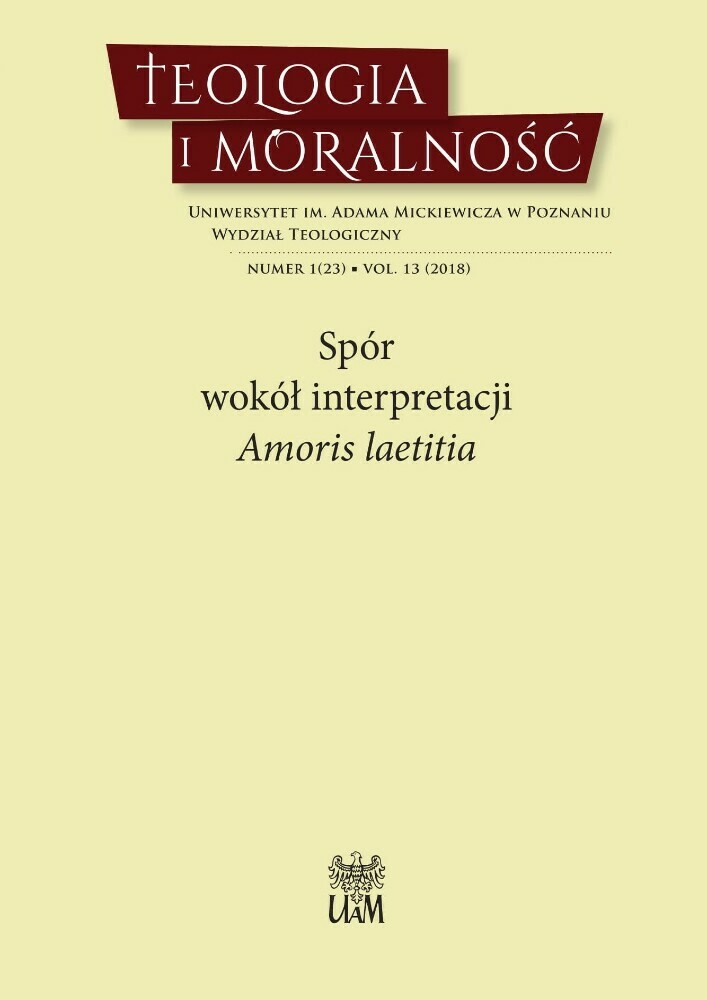Abstract
The ambivalence of some formulations in Chapter VIII of the Apostolic Exhortation Amoris laetitia and the resulting conflict of interpretations that is currently taking place in the Church pose an almost unprecedented challenge for the moral theologian. Only one interpretation consistent with doctrinal Tradition, and in particular with the Magisterium of Saint John Paul II in Familiaris consortio and Veritatis splendor, is capable of honoring the profound intention that motivated Pope Francis: pastoral care for “wounded” and “distant” families. The response to the expectations of the Apostolic Exhortation therefore does not depend on a “paradigm shift” that would introduce exceptions “on a case-by-case basis,” but rather on the task of reconstructing the Christian moral subject and therefore in the educational question from the perspective of the virtues, in a way consistent with the demands of practical reason and of the primacy of grace.References
Abbà G. (1983), Lex et virtus. Studi sull’evoluzione della dottrina morale di san Tommaso d’Aquino, Roma.
Bozzolo A., Chiodi M., Dianin G., Sequeri P., Tinti M. (2015), Famiglia e Chiesa un legame indissolubile. Contributo interdisciplinare per l’approfondimento sinodale, Città del Vaticano.
Cariou P. (1993), Pascal et la casuistique, Paris.
D’Avray D. (2005), Medieval Marriage: Symbolism and Society, Oxford.
Gadamer H.G. (2001), Das hermeneutische Problem und die aristotelischen Ethik, in: Das Problem des historischen Bewuβtsein, üb. T.N. Klass, Tübingen.
Goertz S., Witting C. (Hrsg.) (2016), Amoris laetitia – Wendepunkt für Moraltheologie?, Freiburg.
Granados J. (2015), Eucaristia e divorzio: cambia la dottrina?, Siena.
Granados J., Kampowski S., Pérez-Soba J.J. (2016), Amoris laetitia. Accompagnare, discernere, integrare. Vademecum per una nuova pastorale familiare, Cantagalli, Siena.
Jonsen A.R., Toulmin S. (1988), The Abuse of Casuistry. A History of Moral Reasoning, Berkeley.
Kampowski S. (a cura di) (2017), Pratiche di vita buona per una cultura della famiglia, Siena.
Kasper W. (2016), „Amoris laetitia“: Bruch oder Aufbruch. Eine Nachlese, „Stimmen der Zeit“ 11, s. 723-732.
Kuhn T.S. (1970), The Structure of Scientific Revolution, Chicago.
Lustiger J.M. (1982), Gradualità e conversione, in: AA.VV., La “Familiaris consortio”, Città del Vaticano, s. 31-57.
McIntyre A. (1985), After Virtue. A Study in Moral Theory, 2° edition, London.
Melina L. (2005), La conoscenza morale. Linee di riflessione sul Commento di san Tommaso all’Etica Nicomachea, 2° edizione, Milano, 121 (1° edizione: Città nuova, Roma 1987).
Newman J.H. (1989), An Essay on Development of Christian Doctrine, Notre Dame.
Rhonheimer M. (1994), Praktische Vernunft und Vernunftigkeit der Praxis. Handlungstheorie bei Thomas von Aquin in ihrer Entstehung aus dem Problemkontext der aristotelischen Ethik, Berlin.
Schockenhoff E. (2011), Chanchen zur Versӧhnung. Die Kirche und die wiederverheirateten Geschiedenen, Freiburg.
Schockenhoff E. (2017), Traditionsbruch oder notwendige Weiterbildung? Zwei Lesearten des Nachsynodalen Schreibens „Amoris laetitia”, „Stimmen der Zeit“ 3, s. 147-158.
Valadier P. (2013), Rigorisme contre liberté morale. Les Provinciales : actualité d’une polémique antijésuite, Bruxelles.
License

This work is licensed under a Creative Commons Attribution-NoDerivatives 4.0 International License.
